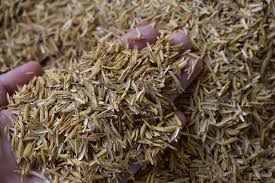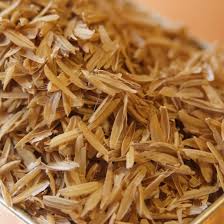Rice husk, also known as rice hull, is the outer protective covering of a rice grain. It is a hard, indigestible outer layer that encases the edible rice kernel. Rice husks are a byproduct of rice milling, which is the process of removing the outer layers of the rice grain to produce the polished white rice that is commonly consumed.
Rice husks primarily consist of cellulose, lignin, and silica. The silica content gives them their hard and abrasive nature. Rice husks are usually light brown to pale yellow in color and have a fibrous and rough texture. The size and shape of rice husks can vary depending on the rice variety and the milling process. Generally, they are small and irregularly shaped, with a length of about 5-7 mm.
Rice husks have been used as a source of fuel in some regions. They can be burned to generate heat energy, and the ash residue can also be used as a fertilizer. In some agricultural practices, rice husks are used as bedding material for livestock.
Rice husks can be mixed with other materials to create eco-friendly building components like particleboard, insulation, and roofing materials. Rice husks can be used in various industrial processes, such as in the production of silica, activated carbon, and biofuels.
It is important to note that the utilization of rice husks has gained attention due to their potential for sustainable and eco-friendly applications, particularly in areas where rice production is a significant agricultural activity.
The Economic Importance and Uses of Rice Husk

Rice husk, the outer covering of rice grains, has several economic importance and uses due to its unique properties.
Here are some of the key uses and their explanations, along with examples:
1. Energy Generation: Rice husk is a valuable biomass resource that can be used as a source of energy through combustion or gasification. It is a renewable fuel that can be utilized to generate heat and electricity. The high silica content in rice husk contributes to its efficient combustion.
Rice husk can be burned in specialized boilers to produce steam, which can then drive turbines to generate electricity. This is particularly useful in areas where traditional fossil fuels are scarce.
2. Fuel and Charcoal Production: Rice husk can be transformed into charcoal or biochar through pyrolysis, a process that involves heating the husk in the absence of oxygen. Charcoal produced from rice husk can be used as a fuel or as a soil amendment to improve soil fertility and water retention. Biochar produced from rice husk can be mixed with compost to enhance its nutrient-holding capacity and improve plant growth in agricultural fields.
3. Construction Materials: Rice husk can be used as a raw material to produce building materials such as boards, panels, and bricks. These materials are lightweight, cost-effective, and environmentally friendly.
Read Also: Rice Anther: Economic Importance, Uses and By-Products
4. Animal Bedding: Rice husk can be used as bedding material for livestock, such as poultry and cattle. It offers good absorbency and helps keep the animals clean and dry. In poultry farming, rice husk bedding can absorb moisture from droppings and reduce the risk of disease and odor.
5. Silica Extraction: Rice husk contains a high amount of silica, which can be extracted and used in various industries, including electronics, ceramics, and refractories. Silica extracted from rice husk can be used as a raw material in the production of silicon chips for electronic devices.
6. Pesticide and Fertilizer Production: Rice husk ash can be processed and used to produce natural pesticides and fertilizers, as it contains beneficial nutrients and compounds. Rice husk ash can be processed to create potassium-rich fertilizers that enhance soil fertility and promote plant growth.
7. Waste Water Treatment: Rice husk can be used as a filtration medium for wastewater treatment. Its porous structure helps remove contaminants from water. In water treatment plants, rice husk can be used in filtration systems to remove impurities and particles from water before it is released into natural water bodies.
8. Composting and Vermicomposting: Rice husk can be added to compost piles or vermicomposting systems to improve aeration and moisture retention, leading to faster decomposition and nutrient-rich compost.
9. Insulation Material: Rice husk can be processed and used as an insulation material in buildings and industrial applications. Its low thermal conductivity makes it suitable for insulating walls, roofs, and even refrigeration units. Rice husk insulation can help regulate indoor temperatures and reduce energy consumption for both heating and cooling.
10. Soil Amendment and Erosion Control: Rice husk can be mixed with soil to improve its structure, water-holding capacity, and nutrient content. It is also used for erosion control on slopes and embankments. Applying rice husk to soil can prevent erosion, enhance soil fertility, and promote better plant growth in areas prone to erosion.
11. Packaging Material: Rice husk can be processed into biodegradable packaging materials, reducing the environmental impact of single-use plastics. Rice husk-based packaging materials can replace traditional plastics for items like trays, cups, and disposable cutlery.
12. Brick Production: Rice husk ash can be used in the production of bricks, improving their strength and reducing energy consumption during firing. Mixing rice husk ash with clay can lead to the production of more durable and energy-efficient bricks for construction.
13. Animal Feed and Nutrition: Rice husk can be used as a feed ingredient for livestock, providing dietary fiber and improving gut health. Rice husk can be included in the diets of animals like poultry, pigs, and ruminants to enhance their digestion and overall health.
14. Mushroom Cultivation: Rice husk can be used as a substrate for growing mushrooms due to its ability to retain moisture and provide a suitable environment for fungal growth. Oyster mushrooms and other varieties can be cultivated on rice husk substrates, making use of its natural properties to support mushroom growth.
15. Carbon Capture: Rice husk can be used for carbon capture and sequestration in soil, contributing to climate change mitigation efforts. Incorporating rice husk into soil can enhance its carbon storage capacity, helping to reduce atmospheric carbon dioxide levels.
16. Biogas Production: Rice husk can be used as a feedstock for anaerobic digestion, a process that produces biogas (methane and carbon dioxide) used for energy generation. Biogas plants can utilize rice husk along with other organic waste materials to produce renewable biogas for cooking or electricity generation.
The Products and By-products That Can Be Derived From Rice Husk

Rice husk is the outer protective layer of rice grains, commonly removed during the milling process. It is rich in various organic and inorganic components, making it a valuable resource for the production of several products and by-products.
Here are some of the main products and by-products that can be derived from rice husk, along with explanations, examples, and processes:
1. Rice Husk Ash (RHA): RHA is the primary by-product obtained from burning rice husk. It contains high amounts of silica, making it useful in various applications such as:
2. Silica Extraction: RHA is burned to extract silica, which can be used in industries like construction, ceramics, and refractories.
3. Concrete Additive: RHA can be used as a pozzolanic material in concrete, enhancing its strength and durability. RHA can be processed into insulating materials for use in construction. Rice husk is burned at high temperatures to obtain rice husk ash.
4. Activated Carbon: Rice husk can be converted into activated carbon, which is used in water purification, air filtration, and various industrial processes. Rice husk is carbonized, and the resulting carbon is activated using steam or chemicals.
5. Biochar: Similar to activated carbon, biochar is a porous carbon material that can be used as a soil conditioner and for carbon sequestration. Rice husk is carbonized at lower temperatures compared to activated carbon production.
6. Biomass Energy: Rice husk can be used as a biomass fuel to generate heat and power in industrial boilers and power plants. Rice husk is burned in combustion systems to produce heat or electricity.
7. Silicon Carbide: Rice husk can be used to produce silicon carbide, a ceramic material used in abrasives, cutting tools, and electronics. Rice husk is heated with carbon in an electric furnace to produce silicon carbide.
Read Also: Rice Bran: Economic Importance, Uses and By-Products
8. Animal Bedding: Ground rice husk can be used as bedding material for animals due to its absorbent properties.
9. Filling Material: Rice husk can be used as a filler in various applications such as plastic composites, rubber products, and textiles.
10. Fertilizer: After proper treatment, rice husk can be used as a component in organic fertilizers, contributing to soil health and nutrient content.
11. Fungi Cultivation: Rice husk can serve as a substrate for cultivating edible and medicinal mushrooms.
12. Insulation Boards: Rice husk can be combined with binders to create insulation boards for use in construction.
13. Pulp and Paper: Rice husk can be processed to produce pulp for making paper products.
14. Biogas Production: Rice husk can be used as a feedstock in anaerobic digestion to produce biogas for energy.
These examples of the diverse range of products and by-products that can be derived from rice husk. The choice of process and application depends on factors such as local demand, available technology, and economic viability.
In conclusion, the processes mentioned may vary in efficiency and environmental impact, so careful consideration is required when choosing the appropriate utilization method.
Read Also: Anatomy of Fishes: Female Fish and their Reproductive Strategies





